Business Ethics and Global Perspectives Assignment Analysis
VerifiedAdded on 2020/04/15
|5
|888
|38
Homework Assignment
AI Summary
This document offers a comprehensive solution to a business ethics assignment, addressing fundamental concepts such as the definition of a professional, contrasting it with everyday language usage, and providing examples from Shaw et al. (2016). It explores the moral obligations of professionals, the nature of ethical dilemmas, and provides an example of such a dilemma. The assignment also delves into the concept of informed consent, clarifying situations where it might be compromised in the workplace. Finally, it outlines the purpose of ethics in enabling improved decision-making and fostering harmonious social interactions, referencing Shaw (2013). The assignment solution offers clear explanations and relevant examples to help students understand key ethical principles in a business context.
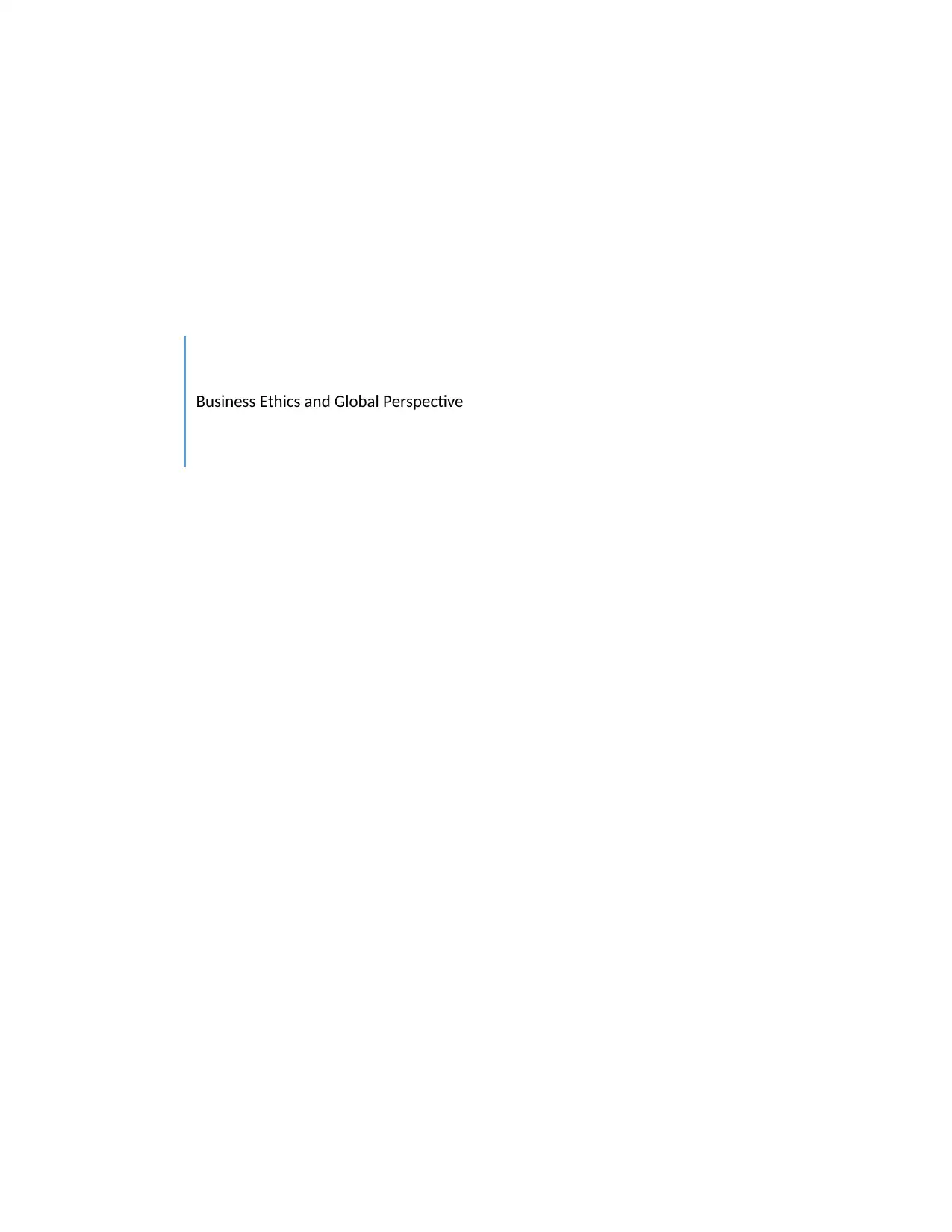
Business Ethics and Global Perspective
Paraphrase This Document
Need a fresh take? Get an instant paraphrase of this document with our AI Paraphraser
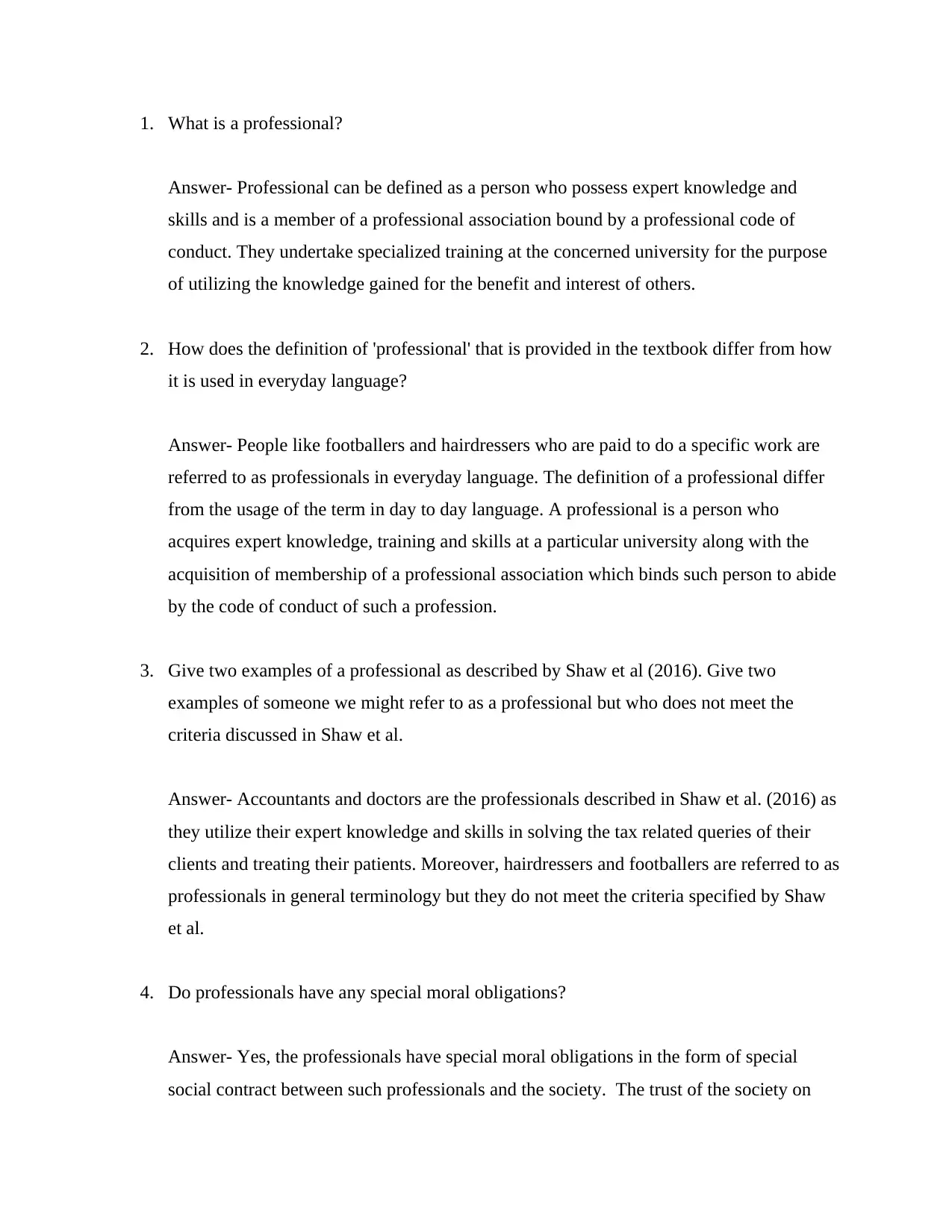
1. What is a professional?
Answer- Professional can be defined as a person who possess expert knowledge and
skills and is a member of a professional association bound by a professional code of
conduct. They undertake specialized training at the concerned university for the purpose
of utilizing the knowledge gained for the benefit and interest of others.
2. How does the definition of 'professional' that is provided in the textbook differ from how
it is used in everyday language?
Answer- People like footballers and hairdressers who are paid to do a specific work are
referred to as professionals in everyday language. The definition of a professional differ
from the usage of the term in day to day language. A professional is a person who
acquires expert knowledge, training and skills at a particular university along with the
acquisition of membership of a professional association which binds such person to abide
by the code of conduct of such a profession.
3. Give two examples of a professional as described by Shaw et al (2016). Give two
examples of someone we might refer to as a professional but who does not meet the
criteria discussed in Shaw et al.
Answer- Accountants and doctors are the professionals described in Shaw et al. (2016) as
they utilize their expert knowledge and skills in solving the tax related queries of their
clients and treating their patients. Moreover, hairdressers and footballers are referred to as
professionals in general terminology but they do not meet the criteria specified by Shaw
et al.
4. Do professionals have any special moral obligations?
Answer- Yes, the professionals have special moral obligations in the form of special
social contract between such professionals and the society. The trust of the society on
Answer- Professional can be defined as a person who possess expert knowledge and
skills and is a member of a professional association bound by a professional code of
conduct. They undertake specialized training at the concerned university for the purpose
of utilizing the knowledge gained for the benefit and interest of others.
2. How does the definition of 'professional' that is provided in the textbook differ from how
it is used in everyday language?
Answer- People like footballers and hairdressers who are paid to do a specific work are
referred to as professionals in everyday language. The definition of a professional differ
from the usage of the term in day to day language. A professional is a person who
acquires expert knowledge, training and skills at a particular university along with the
acquisition of membership of a professional association which binds such person to abide
by the code of conduct of such a profession.
3. Give two examples of a professional as described by Shaw et al (2016). Give two
examples of someone we might refer to as a professional but who does not meet the
criteria discussed in Shaw et al.
Answer- Accountants and doctors are the professionals described in Shaw et al. (2016) as
they utilize their expert knowledge and skills in solving the tax related queries of their
clients and treating their patients. Moreover, hairdressers and footballers are referred to as
professionals in general terminology but they do not meet the criteria specified by Shaw
et al.
4. Do professionals have any special moral obligations?
Answer- Yes, the professionals have special moral obligations in the form of special
social contract between such professionals and the society. The trust of the society on
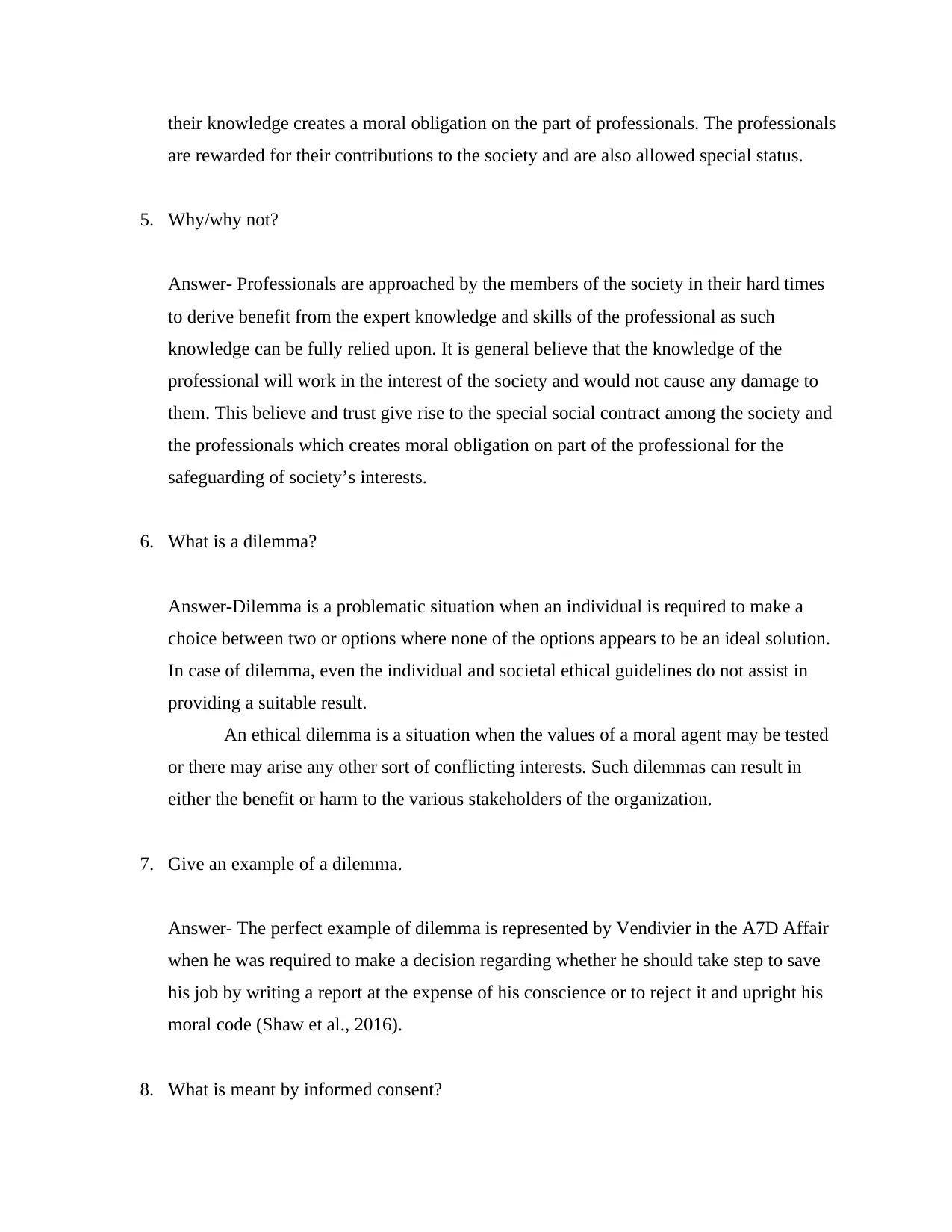
their knowledge creates a moral obligation on the part of professionals. The professionals
are rewarded for their contributions to the society and are also allowed special status.
5. Why/why not?
Answer- Professionals are approached by the members of the society in their hard times
to derive benefit from the expert knowledge and skills of the professional as such
knowledge can be fully relied upon. It is general believe that the knowledge of the
professional will work in the interest of the society and would not cause any damage to
them. This believe and trust give rise to the special social contract among the society and
the professionals which creates moral obligation on part of the professional for the
safeguarding of society’s interests.
6. What is a dilemma?
Answer-Dilemma is a problematic situation when an individual is required to make a
choice between two or options where none of the options appears to be an ideal solution.
In case of dilemma, even the individual and societal ethical guidelines do not assist in
providing a suitable result.
An ethical dilemma is a situation when the values of a moral agent may be tested
or there may arise any other sort of conflicting interests. Such dilemmas can result in
either the benefit or harm to the various stakeholders of the organization.
7. Give an example of a dilemma.
Answer- The perfect example of dilemma is represented by Vendivier in the A7D Affair
when he was required to make a decision regarding whether he should take step to save
his job by writing a report at the expense of his conscience or to reject it and upright his
moral code (Shaw et al., 2016).
8. What is meant by informed consent?
are rewarded for their contributions to the society and are also allowed special status.
5. Why/why not?
Answer- Professionals are approached by the members of the society in their hard times
to derive benefit from the expert knowledge and skills of the professional as such
knowledge can be fully relied upon. It is general believe that the knowledge of the
professional will work in the interest of the society and would not cause any damage to
them. This believe and trust give rise to the special social contract among the society and
the professionals which creates moral obligation on part of the professional for the
safeguarding of society’s interests.
6. What is a dilemma?
Answer-Dilemma is a problematic situation when an individual is required to make a
choice between two or options where none of the options appears to be an ideal solution.
In case of dilemma, even the individual and societal ethical guidelines do not assist in
providing a suitable result.
An ethical dilemma is a situation when the values of a moral agent may be tested
or there may arise any other sort of conflicting interests. Such dilemmas can result in
either the benefit or harm to the various stakeholders of the organization.
7. Give an example of a dilemma.
Answer- The perfect example of dilemma is represented by Vendivier in the A7D Affair
when he was required to make a decision regarding whether he should take step to save
his job by writing a report at the expense of his conscience or to reject it and upright his
moral code (Shaw et al., 2016).
8. What is meant by informed consent?
⊘ This is a preview!⊘
Do you want full access?
Subscribe today to unlock all pages.

Trusted by 1+ million students worldwide
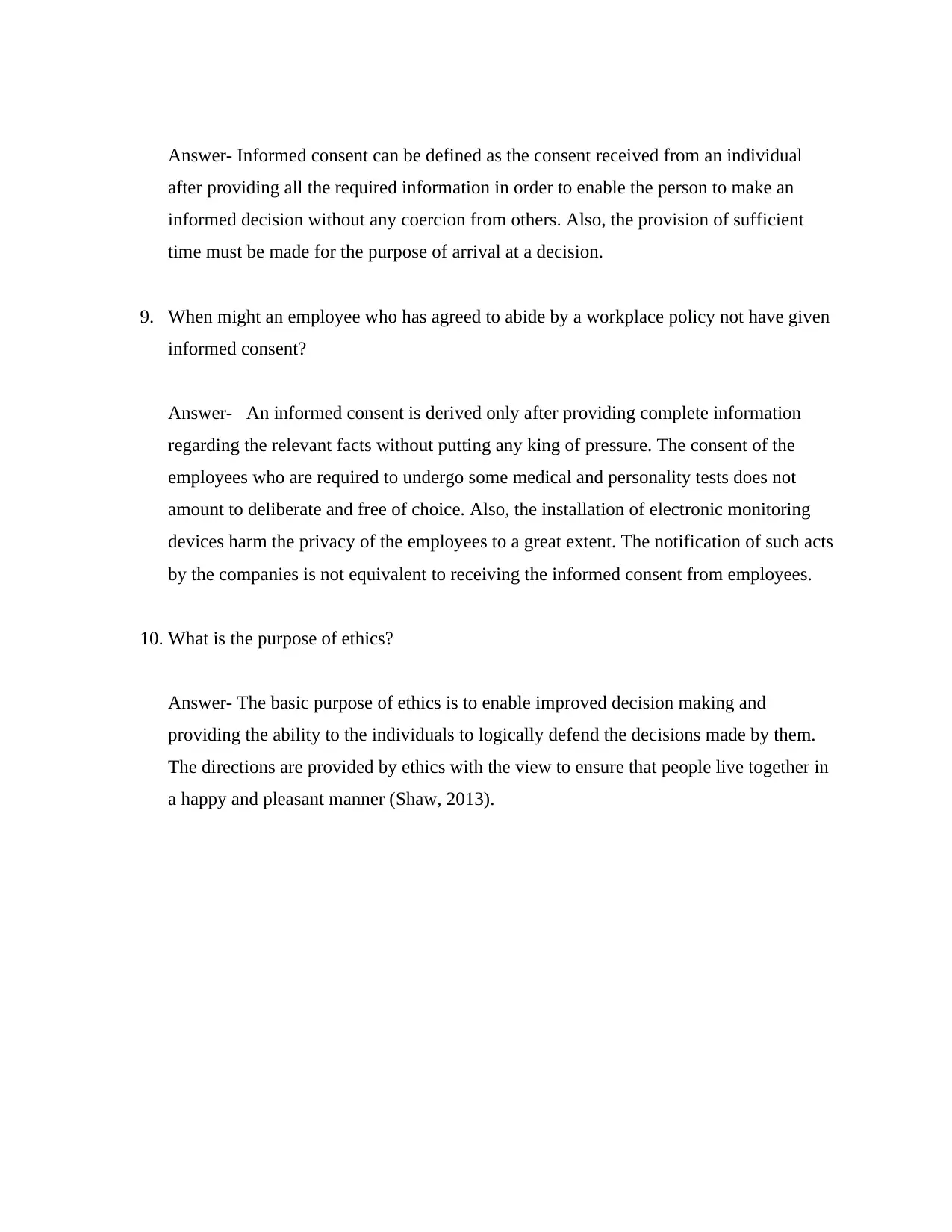
Answer- Informed consent can be defined as the consent received from an individual
after providing all the required information in order to enable the person to make an
informed decision without any coercion from others. Also, the provision of sufficient
time must be made for the purpose of arrival at a decision.
9. When might an employee who has agreed to abide by a workplace policy not have given
informed consent?
Answer- An informed consent is derived only after providing complete information
regarding the relevant facts without putting any king of pressure. The consent of the
employees who are required to undergo some medical and personality tests does not
amount to deliberate and free of choice. Also, the installation of electronic monitoring
devices harm the privacy of the employees to a great extent. The notification of such acts
by the companies is not equivalent to receiving the informed consent from employees.
10. What is the purpose of ethics?
Answer- The basic purpose of ethics is to enable improved decision making and
providing the ability to the individuals to logically defend the decisions made by them.
The directions are provided by ethics with the view to ensure that people live together in
a happy and pleasant manner (Shaw, 2013).
after providing all the required information in order to enable the person to make an
informed decision without any coercion from others. Also, the provision of sufficient
time must be made for the purpose of arrival at a decision.
9. When might an employee who has agreed to abide by a workplace policy not have given
informed consent?
Answer- An informed consent is derived only after providing complete information
regarding the relevant facts without putting any king of pressure. The consent of the
employees who are required to undergo some medical and personality tests does not
amount to deliberate and free of choice. Also, the installation of electronic monitoring
devices harm the privacy of the employees to a great extent. The notification of such acts
by the companies is not equivalent to receiving the informed consent from employees.
10. What is the purpose of ethics?
Answer- The basic purpose of ethics is to enable improved decision making and
providing the ability to the individuals to logically defend the decisions made by them.
The directions are provided by ethics with the view to ensure that people live together in
a happy and pleasant manner (Shaw, 2013).
Paraphrase This Document
Need a fresh take? Get an instant paraphrase of this document with our AI Paraphraser
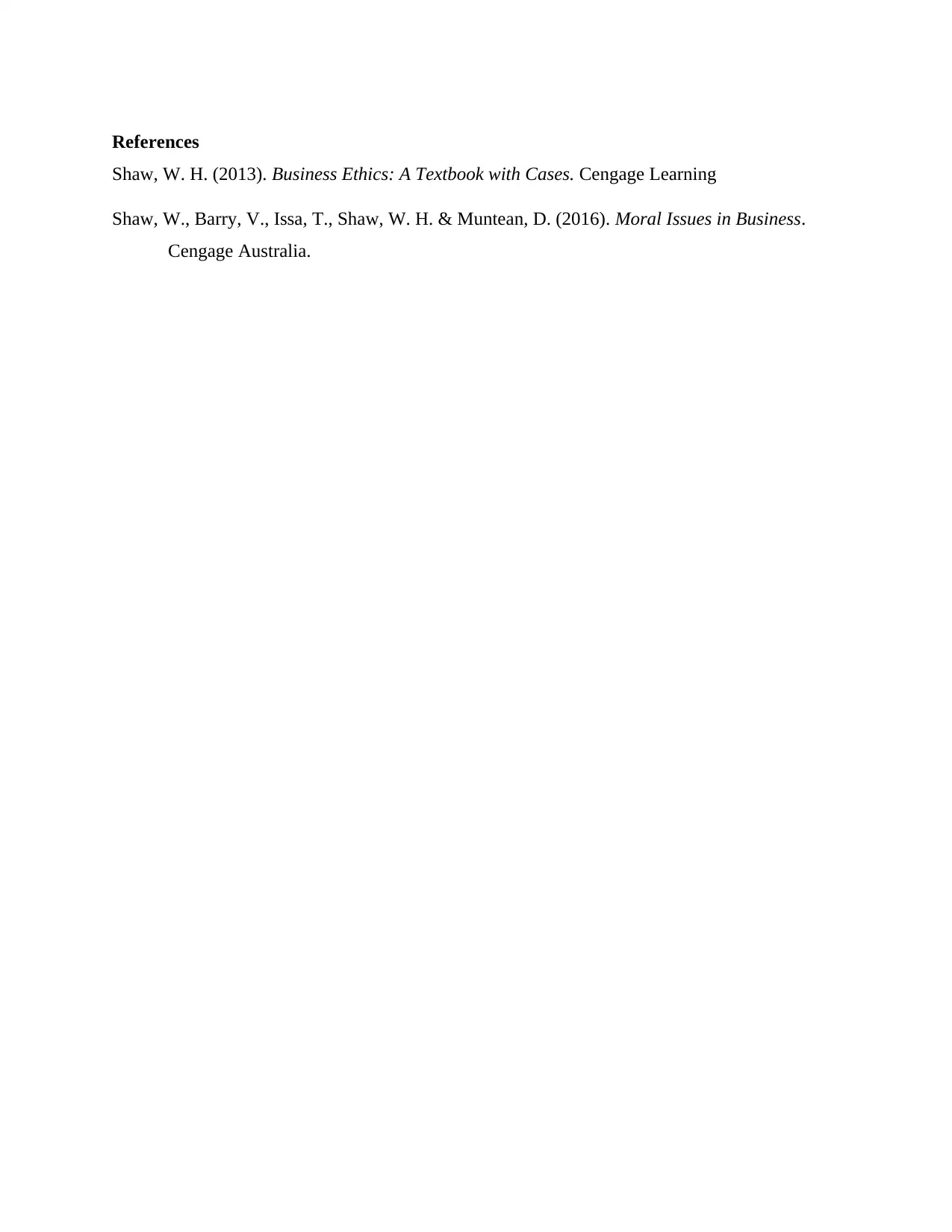
References
Shaw, W. H. (2013). Business Ethics: A Textbook with Cases. Cengage Learning
Shaw, W., Barry, V., Issa, T., Shaw, W. H. & Muntean, D. (2016). Moral Issues in Business.
Cengage Australia.
Shaw, W. H. (2013). Business Ethics: A Textbook with Cases. Cengage Learning
Shaw, W., Barry, V., Issa, T., Shaw, W. H. & Muntean, D. (2016). Moral Issues in Business.
Cengage Australia.
1 out of 5
Related Documents
Your All-in-One AI-Powered Toolkit for Academic Success.
+13062052269
info@desklib.com
Available 24*7 on WhatsApp / Email
![[object Object]](/_next/static/media/star-bottom.7253800d.svg)
Unlock your academic potential
Copyright © 2020–2026 A2Z Services. All Rights Reserved. Developed and managed by ZUCOL.





